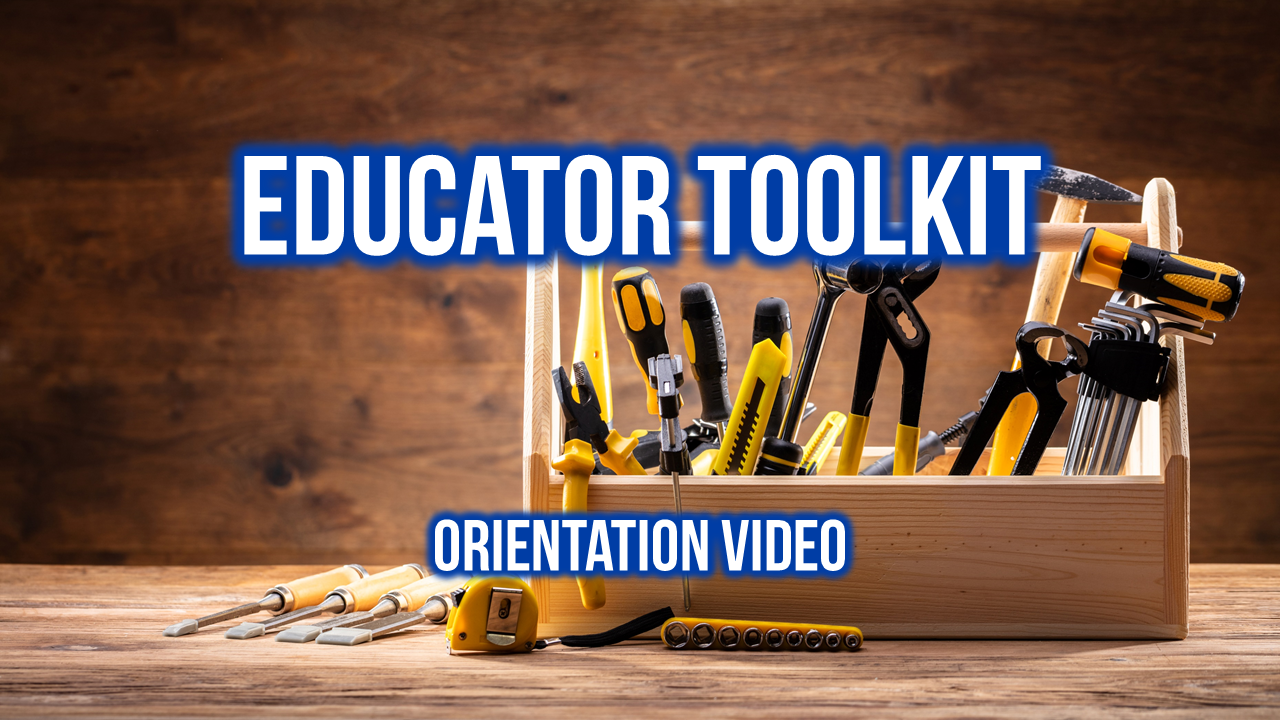Don’t underestimate the importance of educators in our society. Taking on the task of developing young minds is a monumental task.
Common stressors
Classroom size and management
Deadlines (grading, publishing, grant applications, etc.)
Lack of planning time
Budget cuts
Focus on testing
Changing standards
Dealing with parents and/or disruptive students
Perceived lack of support
High workload/second job
Teaching, at any level, is a rewarding, yet demanding, career. With long hours, competing demands, multiple stakeholders and new complexities in the classroom, it’s common for educators to struggle with developing balance and building resilience.
Whether you’re a new teacher or an experienced educator, the Educator Toolkit provides information, tools and resources to help you be your best – both inside and outside of the classroom.
Regardless of what brought you to here today, this toolkit is filled with valuable information and resources to support educators at all levels.
To utilize the resources within this toolkit, simply scroll down and take a look around.
As always, the services within your employee or member assistance program are available 24/7/365. To contact the EAP or MAP, use the phone number found on the program’s promotional materials or web portal, which can be accessed at the bottom of this page.
Orientation video
Watch this short video to learn more about how your employee assistance program (EAP) or member assistance program (MAP) supports educators.
Tip sheets
Managing the classroom
How you handle classroom challenges can make or break the rest of the year. Stay on track with these strategies.
Budget boosters
Looking for ideas for stretching your classroom budget? Try these:
Bullying prevention
According to the National Center of Education, one out of every five students has been bullied. As an educator, what can you do about it?
For new teachers
Your first year of teaching can be both exciting and overwhelming at the same. Here are some tips and advice for teachers just starting out.
Educator resources
Professional organizations
These professional organizations are a vital resource for educators interested in pursuing professional development or connecting with like-minded professionals.
Association of American Educators (AAE) – Established in 1994, the AAE was formed when educators recognized the need for an organization that was student-centric, focusing on student achievement above all else.
National Education Association (NEA) – The NEA is the largest professional employee organization for public school teachers. The association's 3,000,000 members are committed to advancing the cause of public education. NEA represents educators at every level, from preschool to graduate school.
National Council of Teachers of English – This group represents English teachers and is dedicated to improving the teaching and learning of English and language arts at every level of education.
National Science Teachers Association (NSTA) – Representing about 55,000 science teachers, supervisors, administrators and scientists, the NSTA is the largest organization in the world committed to excellence and innovation in science teaching and learning.
National Council of Teachers of Mathematics (NCTM) – Serving as the public voice of mathematics education, the NCTM supports teachers to ensure high-quality mathematics education for all students. NCTM envisions a world in which everyone is enthusiastic about mathematics.
Music Teachers National Association (MTNA) – Founded in 1876, the MTNA remains steadfast in its commitment to advancing the value of music study and music making through the professionalism of music teachers.
Open access journals
Professional journals are peer-reviewed periodicals. The journals listed in this section are available online at no charge. They are an excellent source for the most current research and reviews in the education field.
Creative Education – This monthly journal is dedicated to the latest advancements in creative education. The journal's goal is to maintain a record of state-of-the-art research in areas of advising and counseling, business education, curriculum development, elementary education and more. CE only publishes original, unpublished material.
Journal of Science Education and Technology – This is an international, interdisciplinary journal that publishes both invited and contributed articles concerning education at all levels. The broad range of papers includes biology, chemistry, physics, mathematics, computer science and engineering.
International Education Studies – This Canadian journal uses a double-blind, peer-review process to cover topics like education methods, education policy, education development, classroom technology, classroom psychology, special education and cross-cultural learning.
International Journal of Education & the Arts (IJEA) – The IJEA is a platform for discussing the significance of art in education. The journal maintains the goal of being a communal space where a dialogue revealing art education's potential can be discovered. IJEA publishes primarily peer-reviewed content on topics such as aesthetics, art theory, music education and education in literature.
Journal of Urban Mathematics Education (JUME) – Published twice a year, the mission of JUME is to cultivate a transformative academic space in mathematics. JUME embraces critical research, emancipatory pedagogy and scholarship of engagement in urban communities.
Education Next – This journal aims to provide a clear and unbiased view of the facts in a stormy sea of education reform. The journal's view is that change is needed in American K-12 education; while Education Next does not endorse any particular program, campaign or ideology, it focuses on where the facts lead.
Teaching blogs
Blogs offer a conversational approach to the latest teaching industry news. Industry professionals often write blogs that contain the thoughts and concerns in common among professionals in the education industry.
Edudemic – A blog about the confluence of technology and education. It features posts on topics such as online learning and technology in the classroom.
Flipped Learning – The blog of Jon Bergmann, the winner of the Presidential Award for Excellence for Math and Science Teaching, aims to turn learning on its head. A pioneer in the Flipped Class Movement, this blog offers insight and guidance into classroom flipping.
Free Technology for Teachers – With shrinking budgets and vanishing resources, educators are constantly forced to find new and innovative means of delivering instruction. This blog is chock-full of free technology resources for classroom teachers.
The Innovative Educator – Lisa Nielsen is the Innovative Educator. She shares her ideas and resources with teachers, parents and young people. A certified teacher, administrator and speaker, Lisa engages readers with ways to prepare students for real-world success.
The Organized Classroom – Written by educator Charity Preston, gives readers access to ideas and techniques for creating and maintaining an organized classroom.
Additional toolkits
Work-Life Toolkit – Full of resources and helpful tips to help you navigate concerns and boost your quality of life.
Mental Health Toolkit – Empowers educators to develop skills to help identify, understand and respond to signs of mental illnesses through tip sheets, flash courses, helpful apps and more.
Meditation Toolkit – Boost your self-confidence, empathy, compassion and patience as an educator by practicing mindful meditation at the start of each day.
Mindfulness Toolkit – Audio lessons, tip sheets and other resources to help educators navigate through common workplace distractions and redirect their focus on their students.
Resilience Toolkit – Overcome various challenges with resources to apply energy and passion into caring for yourself.
Sleep Fitness Toolkit – Designed to help you learn good sleep habits and achieve healthy sleep.
Grief and Loss Toolkit – Equip yourself with resources to understand your emotions, find ways to cope and discover a way to live with grief as you move forward.
Critical Incidents Toolkit – Use this to guide you and provide insight on practical steps and ways to move forward in the aftermath, with helpful coping skills to manage the emotional distress that often accompanies critical incidents.
Natural Disaster Toolkit – Access resources before, during and after a natural disaster to help you prepare as best you can and assist in reconstructing your life in the aftermath.
DEI Toolkit – Learn about the different dimensions of diversity, equity and inclusion (DEI) initiatives, improve teamwork and build a supportive workplace.
Wellbeing Place blog – Fresh content to help support educators’ emotional and physical health and overall wellbeing.
Access your EAP or MAP for additional support
To contact your EAP or MAP, type your employer, association or group name (all lower case, with no spaces) into the field below and click “SUBMIT” and you will be taken to the EAP or MAP web portal.



